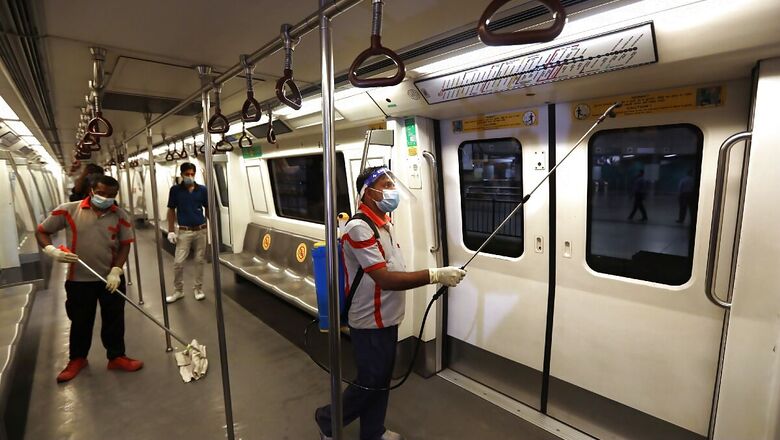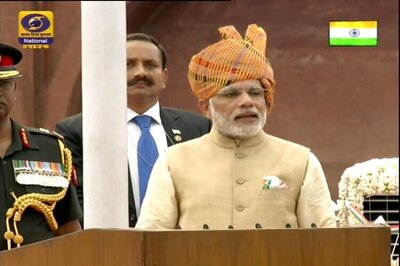
views
Metro services across the country are all set to resume in a graded manner from Monday (September 7). The stations in Covid-19 containment zones will, however, remain closed. The Union housing and urban affairs ministry has said that trains will not stop at stations where passengers are found not maintaining social distancing.
Metro services were suspended in late March when the government announced a nationwide lockdown to check the spread of the novel coronavirus. This comes at a time when AIIMS Director Dr Randeep Guleria has said that some parts of India are witnessing a second wave of Covid-19 cases. He added that people are now tired of taking safety measures, and in Delhi, they can be seen without masks, and gathering in crowds. This is one of the reasons for the spike in the number of cases, Guleria said.
Here’s How Metro Services in Your City Will Resume:
DELHI
The Delhi Metro, known to be the lifeline of the national capital, will hit the tracks once again from Monday after coming to a screeching halt for almost six months due to the coronavirus pandemic. The resumption of services in a phased manner has come at a time when reports suggest that Delhi is witnessing ‘second wave’ of viral infection.
On Monday and Tuesday, only the yellow line, covering 49 kilometre with 37 stations consisting of 20 underground and 17 elevated stations, will remain operational for a period of four hours each in the morning from 7 am to 11 am and evening from 4 pm to 8 pm.
The government has allowed for the metro rail service to resume in a bid to restart the economy, while also keeping in mind the huge loss incurred by the corporation in the last few months.
Even though the government has, time and again, asserted that both lives and livelihood are important, several epidemiologists believe that resumption of the Metro will further increase the infection in the city.
“Over a period of next five days, rest of the lines will also be made operational with all safety measures in place to check the spread of Covid-19 in the Metro premises which requires everyone to follow a new normal of social distancing, face mask and hand sanitisation,” Anuj Dayal, DMRC’s Executive Director of Corporate Communications, was quoted as saying by IANS on Sunday.
People have been advised to avoid unnecessary travel as far as possible and advised to stagger travel timings for office, home, other works to the extent possible so that the carrying capacity offered with new norms can be reasonably utilized by creating a travel pattern in which people are not rushing to the station in morning or peak hours only.
“Rather, people are coming equitably at all hours of the operational timings of the Metro services to ‘break the peak’— a requirement of the present times. Besides ‘Break the Peak’, DMRC appeals to commuters to ‘Talk Less’ during travel in the Metro to prevent the possibility of short-range aerosol transmission,” DMRC said in a statement.
To maintain orderliness and regulate flow of passengers with social distancing norms, only one or two gates will be kept open for entry and exit of passengers at a station.
DMRC said that apart from regular frontline staff at the stations, it has made additional deployment of around 1,000 officials and staff across the line to assist and guide passengers in the wake of new norms of travel which may take some time to settle in.
Though DMRC is making all out efforts to provide its passengers a continuous and seamless travel experience, however, with the carrying capacity of a train drastically reduced to around 20 per cent of the pre-lockdown period due to social distancing norms.
To prevent the overcrowding in trains and stations, situations might arise wherein, DMRC may have to opt for starting certain empty trains from terminal stations or short loop some trains to manage the crowded zones on a particular route and section.
This dynamic regulation of train movement will be based on the ground situation at given hours and one may have to skip a train or two, leading to extra time in completing the travel.
Similarly, dwell time is also increased by 10-20 seconds at stations for boarding-deboarding to ensure social distancing. This may also increase the total travel time in a journey by a few minutes. In view of these factors, passengers are advised to keep extra time of about 15 to 30 minutes for each travel, to be on time for their desired destinations.
“Be a smart passenger and carry your smart card with you while heading for the Metro. It is contactless, easily rechargeable through online modes and offers a discount up to 20 per cent on every travel,” the corporation added.
Updates for NCR on DMRC Website
Tokens will not be available at the stations for the time being as they need frequent human interface for travel transactions and pose a risk of coronavirus infection so a “smart card is a must for travel”.
Since Delhi Metro operates in Delhi-NCR, it will not be providing services to such stations which fall under the containment zones for any given day in any of the states. State governments of Delhi, Haryana and Uttar Pradesh notify such zones on a regular basis on their websites.
If any of the stations happen to fall in such a zone, the same will also be made public through announcements at stations and trains and through social media updates. Since most of the Metro stations lie on the median of the roads, there is a slim chance for stations to fall in the containment zone as a regular practice.
For better management of crowds at stations, DMRC is also in touch with the authorities to provide around 1,000 civil defence volunteers. Some major stations have also been identified where law enforcement agencies such as local police, etc., will be roped in to monitor law and order situation outside vulnerable areas.
Antigen testing, Cleansing of AC Filters & More for Travellers’ Safety
Also, a request has been made to the authorities to arrange for the antigen testing of around 15,000 staff of DMRC who will be handling the public throughout the day now. This will go a long way in ensuring Covid-free atmosphere in running the services.
Trains will be sanitized at terminal stations. Similarly, once they are back to Depots after the end of the day, they will again be thoroughly sanitized. The train doors will be kept open at terminal stations to jet fresh air infuse in the train.
Regular cleaning of metro stations will be ensured by prioritizing passenger movement areas such as concourse, passages, platforms. All human contact areas — lift buttons, escalator handrails, gates touch points, customer handling points will be disinfected at stations every four hours.
In a bid to wade off people’s fear of catching coronavirus infection in closed and cramped metro compartments, the Delhi Metro Rail Corporation has modified the air conditioning system of the trains to allow 100 per cent inflow of fresh air.
AC filters will also be thoroughly cleansed with sodium hypochlorite solution every seven days, as against the earlier norm of fifteen days. Besides this, earlier only 30 per cent of fresh air was allowed inside the train, which has now been increased to its full capacity.
Use of ‘Aarogya Setu App’ for updating health status by passengers is also advisable. All passengers will be required to undergo thermal screening at the entrance.
Passengers having temperature will not be allowed to travel. They will be directed to report to the nearest medical centre. Only 2-3 persons will be allowed on the lift at a time.
For crowd management, monitoring will also be done through CCTV cameras installed at stations and trains. ‘Divyangjan’ commuters will be facilitated by trained customer facilitation agents ensuring proper social distancing and sanitization.
Delhi Transport Minister Kailash Gahlot inspected the Rajiv Chowk Metro station on Sunday. He said if both the Delhi Metro management and people responsibly follow the protocols in place, safe train operations will set another benchmark in the ‘Delhi model’ of fighting Covid-19.
Delhi Metro operates 389km of Metro network with 285 stations in Delhi-NCR including Rapid Metro in Gurugram and Aqua Line of Noida-Greater Noida Metro. About 70 per cent of its passengers used to travel by using the smart cards. Overall passenger journeys performed in a day before the Covid-19 stuck our country was around 60 lakh.
Airport-like ‘Touch-free’ Security Check
The CISF has planned an airport-like “contact-free” security check for the Delhi Metro and will deploy modified hand-held and doorframe metal detectors for scanning passengers, who will be required to put metallic objects such as belts and pens in their bags.
As per the new ‘business continuity plan’ prepared by the force for resumption of the metro services, the personnel will scan commuters using a hand-held metal detector which has been attached to a lean wooden stick so that there is a safe physical distance between the scanner and the passenger. The plan has been prepared to ensure the health and security of metro staff and the passengers are not compromised.
GURUGRAM
The Gurugram District Administration will appoint a nodal officer who will be in touch with Delhi Metro Rail Corporation (DMRC) officials in order to facilitate Metro operations in the city.
The DMRC has five Metro stations in Gurugram — Huda City Centre, Iffco Chowk, MG Road, Sikandarpur and Guru Dronacharya.
“For smooth operation of the Delhi Metro, we have decided to appoint a nodal officer who will remain in touch with Metro officials for smooth functioning of services in Gurugram,” said Amit Khatri, Deputy Commissioner of Gurugram.
Apart from this, the health officials said, the list of health centres and Covid-19 hospitals will be made available to the representative of DMRC near the five metro stations falling in the district of Gurugram so far. If any passenger is found infected from corona it can be sent there for further treatment.
NOIDA
Commuters found travelling without face masks in the Noida-Greater Noida metro rail network, also known as the Aqua Line, will have to pay a fine of Rs 500 and those caught spitting will have to cough up Rs 100.
The Noida Metro Rail Corporation (NMRC) has set up counters at a few selected metro stations where masks will be available on payment basis for needy commuters for a minimum of Rs 5 and maximum Rs 30 for each mask. The stations where these counters will be set up are Sector 51, NSEZ and Pari Chowk, NMRC Managing Director Ritu Maheshwari said in a statement.
BENGALURU
The first run will start on the Purple Line from Monday, while the trains on Green Line will operate from September 9.
In the Purple Line, the trains will run for six hours till September 10 only during the peak hours — three hours in the morning from 8 am to 11 am and 4.30 pm to 7.30 pm. In the Green Line, the trains will operate for two days only during peak hours — three hours in the morning and three in the evening.
From September 11 onwards, the trains will ply on both the lines from 7 am to 9 pm. “The number of commuters allowed in each train is limited to 400 passengers to ensure social distancing norms,” a Bangalore Metro Rail Corporation Ltd official said.
According to BMRCL, the dwell time in each station will be 60 seconds so that passengers shall maintain social distancing while boarding and deboarding. At the Kempe Gowda interchange station, the dwell time will be 75 seconds.
Gates will not be opened in stations coming under the containment zones, it said. The Metro Rail has also made it clear that all passengers will have to use smart cards as token tickets will not be sold.
No card recharge will be done at the stations. Instead, the passengers will have to top up their cards using the BMRCL’s mobile application.
In place of card readers at the entry and exit points,there will be flash readers. Metro Rail authorities noted that the BMRCL incurred huge loss to the tune of crores of rupees during the lockdown.
LUCKNOW
With Lucknow Metro set to resume operations from Monday, it will become the first metro service in India to use ultraviolet (UV) technology for token sanitisation for passenger safety, the organisation said in a statement here. Kumar Keshav, Managing Director of Uttar Pradesh Metro Rail Corporation (UPMRC), on Sunday conducted an inspection and checked an overview of operational preparedness from Hazratganj to Munshipulia stations.
The Lucknow Metro said it has laid special emphasis on contactless travel, sanitisation, social distancing, hygiene and cleanliness. Various rigorous steps have been undertaken to ensure a safe and convenient commuting experience for passengers.
Social distancing markers have been placed on alternate seats to maintain sufficient gap between passengers inside the train. Frequently touched areas inside trains like grab rails, grab poles, grab handles, passenger seats and door surfaces from the inside are sanitised regularly.
Lucknow Metro has also become the first metro with cashless facility of multiple tokens/tickets with GoSmart card. A GoSmart user has a contactless trip right from entering the metro station, boarding the train to exiting the premises. The automatic sensor of AFC gates detects the card from a distance without tapping it. So, the only thing a GoSmart card user comes in contact with are the sanitised train seats.
Social distancing markings and signages are in place at all stations to ensure an adequate gap among passengers while queuing up near ticket counters, ticket vending machines, security check frisking points, entry-exit AFC gates, etc, the statement further said.
KOLKATA
The Metro Railway in Kolkata is planning to run special services for NEET candidates onSeptember 13 to help them reach their examination centres, atop official said Saturday. As per the plan, candidates along with guardians willbe allowed to board the trains on showing their admit cards, Metro Railway general manager Manoj Joshi said. He said the modalities are being worked out and the details will be shared next week. The metro authorities are yet to announce the date of resuming normal services.




















Comments
0 comment